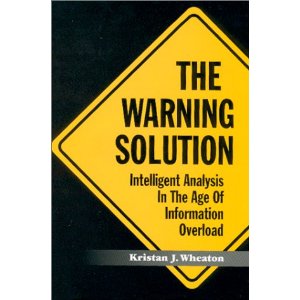
Kristan Wheaton
5.0 out of 5 stars Solving Major Problems Early for 1/50th of the Cost
July 4, 2001
I first heard Kris Wheaton lecture in Europe, and was just blown away by the deep understanding that he demonstrated of why commanders and CEOs are constantly missing the warnings their subordinates and forward scouts are sending back–the huge cost! Kosovo, for example, could have been a $1 billion a year problem if acted upon wisely and early, instead it became a $5 billion a year problem. I like this book very much because it makes his deep insights available to everybody in a very readable, well-illustrated, and concise book.
I strongly recommend this book because it offers the only thoughtful explanation I have ever seen on the conflict between the senior decision-maker's attention span (can only think about $50 billion problems) and the early warning that *is* available but cannot break through to the always over-burdened, sometimes arrogant, and rarely strategic top boss. In this regard, his book is a fine complement to the more historical work by Willard Matthias on “America's Strategic Blunders.”
This book also offers solutions. It is a book that should be required reading for all field grade officers in all military services, as well as state and local governors and majors, university and hospital and other non-profit heads, and of course the captains of industry who spend billions, often unwisely, because they have not established a scouting system that can be heard at the highest levels *in time*. America, among many other nations and organizations, has a habit of ignoring its iconoclasts and mavericks–in an increasingly complex world where catastrophic combinations of failure are going to be more common, such ignorance will eventually become unaffordable and threatening to the national security as well as the national prosperity of those who persist in thinking about old problems in old ways.
There is one other aspect of this book that merits strong emphasis: it focuses on human understanding and human engagement with the world, and makes it clear that technology has almost nothing to do with how well we cope with the external environment that defines our future. There aren't five people in the US government, to take one example, that adequately understand the rich intellectual history of Islam nor the core difference between the Islamic emphasis on knowledge integration as the core value and the Christian emphasis on love as the core value. The author of this book is one of America's foremost authorities on the Balkan conflict and the deep importance of historical and cultural understanding as part of current political and operational competency–we need 1000 more intelligence professionals just like him. This book will inspire and provoke and is a great value for anyone who deals with the world at large.




